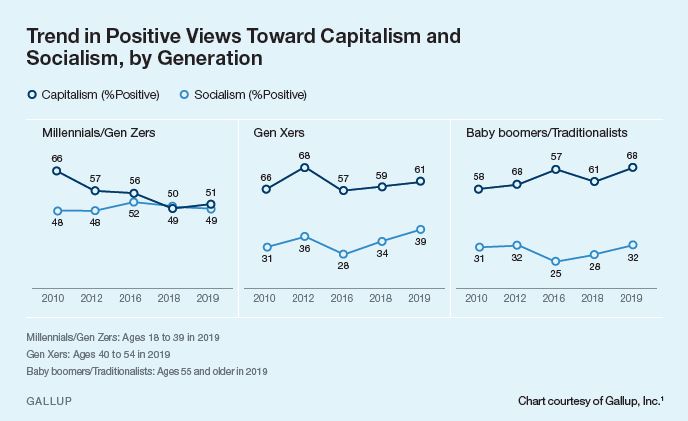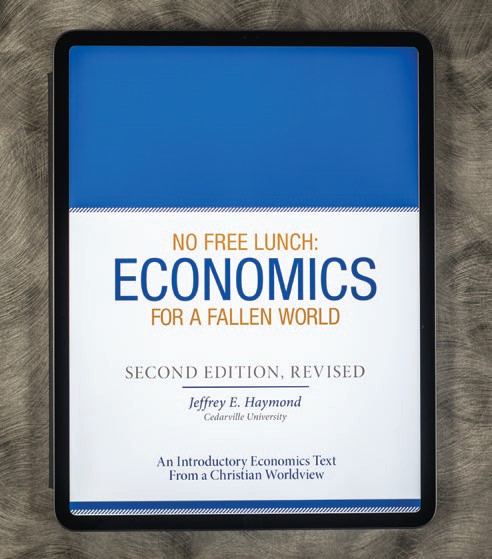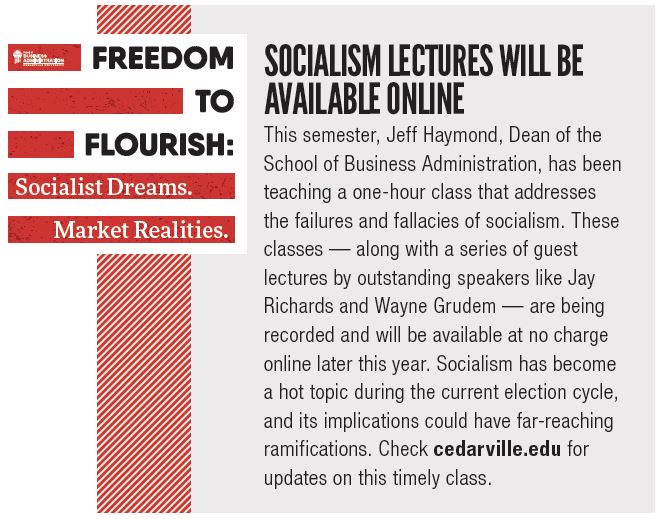by Thomas White
The decline in support for capitalism among young people is alarming. A recent Gallup survey showed that support for socialism among millennials and generation Zers, those ages 18 to 39, has risen steadily and is now almost even with support for capitalism.

Universities across the nation are to blame for much of this trend. The majority of our nation’s colleges and universities enthusiastically embrace secular progressive ideology and intend to indoctrinate the next generation with their values. Consider for example the model curriculum for the required class “Ethnic Studies” issued by the California Education Department, which defines capitalism as “‘a form of power and oppression,’ alongside ‘patriarchy,’ ‘racism,’ ‘white supremacy’ and ‘ableism.’ Capitalism and capitalists appear as villains several times …”2
While the “Ethnic Studies” curriculum makes no sense, we can understand part of the argument against capitalism. We’ve read the headlines. Greed, pride, deception, theft, or deceit have been employed to obtain more profits while disrupting the lives of people. It has happened at a national level through the Great Recession, in a sector like the housing market and its bubble bursting or in individual businesses like Boeing’s rush to sell unsafe planes. Some would have you believe that Christians should recognize the inherent evil of business and capitalism.
But the problem isn’t that business, capitalism, or free enterprise systems are evil in and of themselves. The problem lies within the hearts of sinful men and women who operate within those systems. Without embracing a biblical worldview and the grace of God, humanity’s sinful nature will find a way to abuse any system. The more our nation and businesses abandon moral values, the more corruption we will see in any system. This is precisely why here at Cedarville University we have a missional purpose to send business graduates into the workforce who can be salt and light.
Operating with biblical principles, business provides one of the best means to glorify God and serve others well. Let’s look at just a few principles that come from a biblical worldview.
A BIBLICAL WORLDVIEW ESTABLISHES STEWARDSHIP RESPONSIBILITIES FOR PRIVATE PROPERTY
Exodus 20:15 states, “You shall not steal.” In order for someone to steal something from someone else, you must have ownership of a possession. As Christians, we understand that ultimately, we are called to be good stewards because God created it all, but from a cultural perspective, certain possessions belong to us and not someone else.
As Jeff Haymond, Dean of our School of Business Administration, writes in his book No Free Lunch, “To have stewardship responsibilities (which come from a vertical relationship with God) we must have ownership rights (which reflect a horizontal relationship with others in society).”
As Christians, we must resist temptations to be greedy or idolize possessions. Instead, we imitate God by demonstrating generosity when we voluntarily give to others, and especially to those in need (Heb. 13:16, Prov. 3:9, Acts 20:35). We can also save our possessions to make sure that we have planned well for the future, and we can enjoy some of our possessions personally or with friends and family. How we exercise our stewardship responsibilities is one of God’s primary ways to make us look more like Jesus.
You might ask, “But doesn’t the New Testament support socialism or communal ownership as the better way?” Acts 4:32, 34–35 states, “Now the full number of those who believed were of one heart and soul, and no one said that any of the things that belonged to him was his own, but they had everything in common … There was not a needy person among them, for as many as were owners of lands or houses sold them and brought the proceeds of what was sold and laid it at the apostles’ feet, and it was distributed to each as any had need.”
This passage certainly demonstrates extreme unity and generosity, but the giving here is voluntary and not compelled by governmental forces. This is not a redistribution of wealth by national leaders but a voluntary sharing of personal possessions by Christians seeking to imitate a gracious God. In order to grow more like Christ, we must have the freedom to keep or give. And in a society seemingly always concerned with having more, generosity demonstrates one way that we show counter-cultural love to our neighbors.
We must, however, recognize that Christians in Acts did not give up the right to personal possessions. They met in “their homes” (Acts 2:46) and Paul goes from “house to house” in Ephesus (Acts 20:20). We also see others in the book of Acts owning homes: Mary (Acts 12:12), Jason (Acts 17:5), Titius Justus (Acts 18:7), Philip (Acts 21:8), and Mnason (Acts 21:16). You can find other examples of private ownership if you search the remainder of the New Testament.
More significantly, immediately following the remarkable generosity of Acts 4, Luke records the account of Ananias and Sapphira in Acts 5. Peter states to Ananias, “While it remained unsold, did it not remain your own? And after it was sold, was it not at your disposal? Why is it that you have contrived this deed in your heart? You have not lied to man but to God.”

Peter reaffirms in these words the right of personal ownership while rebuking him for lying to the Holy Spirit. The New Testament church should passionately encourage generosity and caring for the poor as biblical principles, but we must be careful not to endorse a system of all things in common that the book of Acts does not mandate.
Socialist control of the means of production can’t work, and even the “soft socialism” of wealth redistribution leads to lower standards of living for all.
The government cannot give unless it first takes. This redistribution of wealth destroys the incentive to work hard. When citizens who don’t work realize they don’t have to do so because the government will provide and when citizens who do work hard realize someone else just takes more of their money, then we support unbiblical principles. The Bible teaches that we should work hard and then show personal generosity (2 Thess. 3:10–12, Eph. 4:28).
Jeff Haymond, Dean of the School of Business Administration, wrote an e-book, No Free Lunch: Economics for a Fallen World, which is available free online. His book emphasizes free markets as the best outlet for the creativity of mankind made in God’s image. To download No Free Lunch, go to cedarville.edu/nolunchbook.
THE “LOVE” OF MONEY IS THE ROOT OF ALL KINDS OF EVIL (1 TIM. 6:9–10)
1 Timothy 6:9–10 states, “But those who desire to be rich fall into temptation, into a snare, into many senseless and harmful desires that plunge people into ruin and destruction. For the love of money is a root of all kinds of evils. It is through this craving that some have wandered away from the faith and pierced themselves with many pangs.” Money is a great servant but a horrible master. Money, possessions, and riches are all morally neutral items that can be used for good or evil. It’s the idolatry of money, possessions, and riches that is evil. Matthew 6:24 clearly states that you cannot serve God and money. Wealth is not evil and can be part of God’s blessing. Wealth always tests our allegiance and stewardship.
Later in the same chapter, Paul writes in 1 Timothy 6:17–19, “As for the rich in this present age, charge them not to be haughty, nor to set their hopes on the uncertainty of riches, but on God, who richly provides us with everything to enjoy. They are to do good, to be rich in good works, to be generous and ready to share, thus storing up treasure for themselves as a good foundation for the future, so that they may take hold of that which is truly life.”
Paul doesn’t rebuke the rich for their wealth, but he encourages voluntary generosity and their worship to be of the God who provides and not what He has provided.
Consider the Parable of the Minas in Luke 19:11–27 or the Parable of the Talents in Matthew 25:14–30. The master commends those who have demonstrated good stewardship through multiplying resources. While we do not endorse the prosperity Gospel, Scripture consistently commends good stewardship and records God using servants with great wealth to accomplish His purposes.
Furthermore, we should commend someone who determines a way to use resources more effectively. It demonstrates better stewardship of the resources and allows that person or organization to make more profit or sell the goods/services at a lower cost, which frees up scarce resources to be applied to other compelling needs. In other words, making a profit serves our neighbors well and allows for human flourishing.
The evil we see so often pointed out in business or capitalism arises from the sinfulness of our hearts and the selfishness that so frequently characterizes our actions. When leaders withhold fair pay (Deut. 24:14; James 5:4), create hostile environments for workers (Eph. 6:9), increase profits to the detriment of employees, use inferior materials, cut corners, or implement deceptive practices to increase the bottom line (Lev. 25:14), then we see the worst of capitalism. But the worst parts of business are simply mirrors for the worst parts of our own hearts.
As Christians we must resist this temptation and operate at a higher level. As Paul writes in Romans, we must put to death our own deeds of the flesh through the power of the Spirit (Rom. 8:13). We must also fight against larger corruption, or as Paul calls it, “the rulers over this present darkness” (Eph. 6:12), which includes those seeking to exploit or abuse others, such as sex traffickers.
Cedarville University teaches business, capitalism, and free market enterprise with a biblical foundation, training the next generation to use business for a better purpose. As every undergraduate student graduates with a Bible minor, we embrace our higher calling and the opportunity to influence culture through business with biblical principles.
Cedarville University teaches business, capitalism, and free market enterprise with a biblical foundation, training the next generation to use business for a better purpose.
BUSINESS ALLOWS US TO SERVE OTHERS
Picture with me how a business operating through a biblical worldview can influence culture. We recognize that God created humanity with needs and created us for community. When we align our God-given gifts with our God-given passions, we have a platform to be productive. We glorify God as good stewards of our talents and encourage human flourishing.
Creativity and innovation in business reflect the creator God who made us as the pinnacle of creation, and our monetary system demonstrates one way that humanity is set apart from animals. Instead of seeking basic needs or trading one service for another, we receive compensation for a service rendered that can be utilized for our many wants, desires, or needs. Money is necessary in an advanced economy that requires the division of labor, as each one is able to specialize in areas where God has uniquely gifted us.

For example, I would find it incredibly difficult to use my efforts at administration, writing, or public speaking to find someone willing to trade food, clothes, or medical attention for my services. But because of the monetary system, I receive compensation for the service I render to society. The market sets a value through supply and demand on my contribution. If I do a poor job, I’m likely to be without a job or see my compensation reduced. If I make myself more valuable to society or an individual company through serving well, then perhaps I’ll see my wages increase. I then use my wages to purchase other goods and services. In this way we incentivize hard work and encourage human flourishing.
I love the fact that I can determine how much I want to pay for various services. I’m generally frugal, so I choose to stay at mid-level hotels like Holiday Inn or Comfort Inn because I prefer to carry my own bags, park my own car, and eat a “free” breakfast (preferably waffles). Others may desire valet parking, bag delivery, and room service. Those benefits create more expense for the business, which passes the expense to the customer by charging a higher rate. As long as customers desire to pay for the additional services, then the business continues to fill a need in society. Supply and demand in the market sets the value of the goods or services. When the cost exceeds the willingness to pay, the demand decreases and the company must adjust or go out of business.
To the person with a cavity or abscessed tooth, the dentist provides a great service to encourage human flourishing. And as long as the service is rendered with integrity at a fair price, the patient will gladly pay to alleviate the pain. I know from firsthand experience, and I didn’t pick the least expensive office. I wanted a dentist with a good reputation, so I paid more for it. In the years to come, I expect to be pleased with that decision.
The best businesses serve others by meeting a need at a fair price, while paying workers a fair wage to accomplish the given task. Competitive markets determine the just price and wage. These win-win-win scenarios are possible. The owners win through making profits, the workers win through earning a paycheck, and the customer wins through obtaining a desired service. Everyone experiences some level of fulfillment and joy, which encourages human flourishing. And when businesses don’t serve their customers or workers well, they will lose them in a competitive system. The worst businesses have a monopoly over workers or customers. The ironic thing about socialism is that its proponents purport it to be an antidote to capitalist monopolies, when in effect we would make the government the monopoly provider of all
our services.
BUSINESS FOR THE GLORY OF GOD
The best owners and managers understand that there is one God who is Judge of all (James 4:12). This God is the God of owners as well as workers, and He shows no partiality (Acts 10:34). Therefore, owners, mid-level managers, workers, and consumers will all give an account one day for their actions. When we do all things to the glory of God, work as unto the Lord, and seek to love our fellow neighbor as ourselves, then we create a culture where community thrives.
Imagine an environment where leadership values employees more than idolizing profits. Where CEOs serve employees through good leadership rather than lording over them in an authoritarian dictatorship. A place where the company feels more like family, and where people seek to serve everyone else. A place where employees do what is right even when no one is looking. Such places do exist, albeit imperfectly in a fallen world, and these companies provide great workplace communities and serve as examples to influence culture for Christ. In this way, business provides a great opportunity to glorify God and serve others.
A biblical model of business also provides the best long-term solution to poverty. The best way to love the homeless is not to sleep on the street with them, but to help them never have to sleep on the street again. When our helping enables addiction without resolution or rewards panhandling while ignoring the dignity and worth of all human beings, we hurt the recipient and only ease the conscience of the giver. On a personal and global level, we must see every human as created by God with equal value.
CONCLUSION
Cedarville University supports business with a biblical worldview for the glory of God and the good of others. We contend that private ownership, capitalism, and free market enterprise operating by biblical principles and accompanied by personal generosity provide a great channel to influence the culture for the Gospel.
We desire to develop a generation of entrepreneurial-minded business leaders using their gifts to promote human flourishing with creativity and enthusiasm. These business leaders will influence people that may never visit a church. They have a unique opportunity to stand for the Word of God and the Testimony of Jesus Christ.
____________________
Thomas White is President of Cedarville University. He earned his Ph.D. in systematic theology from Southeastern Baptist Theological Seminary.
____________________
1. https://news.gallup.com/poll/268766/socialism-popular-capitalism-among-young-adults.aspx
2. https://www.wsj.com/articles/california-wants-to-teach-your-kids-that-capitalism-is-racist-11564441342



















